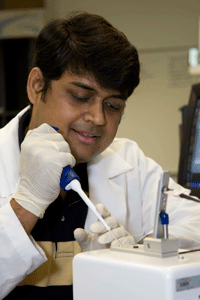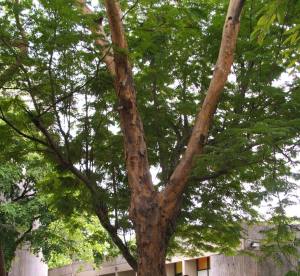Colorado researchers study biodiesel tree



July 14, 2008
BY Erin Krueger
Web exclusive posted July 29, 2008 at 2:51 p.m. CST
Chhandak Basu, a biological sciences assistant professor at the University of Northern Colorado, has received a $49,643 grant from the Colorado Office of Economic Development and International Trade to study the viability of using biodiesel derived from a tropical tree. The university will match the funds, bringing the total amount of grant money to nearly $100,000.
During a two-year collaborative project through the Bioscience Discovery Evaluation Grant Program, Basu is cloning the genes responsible for the production of oleoresin, a diesel-like fuel, produced in the copaiba or "diesel tree." The genes will then be transferred into plants and algae to determine which plants are compatible and can produce the most biodiesel. Basu has been working on the project with University of Tennessee-Knoxville Professor C. Neal Stewart Jr., Ph.D.
According to Basu, oleoresin from genetically modified plants could potentially be mass-produced and used without further refining fuel automobiles. "The agricultural/physiological aspects of oleoresin have been studied extensively, but not the molecular biology part, not the genes responsible for this type of synthesis," Basu said.
The diesel tree itself does not grow well outside of tropical environments, making it unlikely the trees could ever become a reliable source of large-scale biodiesel production. Standing at roughly 40 feet tall, it would take more than ten years of growth for the tree to produce a significant amount of fuel. Even then, a single tree would likely produce approximately 4 or 5 gallons of oleoresin every 6 months. The oleoresin is tapped from the trees in a way that is similar to collecting sap to make maple syrup. One benefit of the substance is that, unlike oil from traditional biodiesel feedstocks such as soybeans, oleoresin doesn't have to be refined or manufactured before it's used.
Basu and two graduate research students will transform Arabidopsis, a small non-invasive flowering plant, and algae with oleoresin genes. Genetic material for use in the study was collected from the copaiba tree by Basu during a trip to the University of Puerto Rico, San Juan.
Basu said Arabidopsis was chosen in part because if successfully modified it would not negatively affect food supplies or strain the economy. The plant is generally referred to as a weed and considered useless. However, due to its six week seed-to-seed life cycle, five chromosomes and small genome size, it's relatively easy to genetically modify, making it a popular choice to use in laboratory experiments. "If [the process] works in Arabidopsis, it will also work with all in that family and other grasses," Basu said.
"I hope that within a year from now the proof of concept could be presented in an international journal," Basu said. "My main goal is to show that this works." He is hopeful that the oleoresin proof of concept will provide economic opportunities that will eventually lead to a partnership to deliver the biofuel.
"I'm really grateful to the state's Office of Economic and International Trade and UNC for offering support," Basu said. "It was a tremendous motivational boost for the lab." Basu said biodiesel created from this process could provide a cheaper alternative to rising gas prices and become part of the solution to ease U.S. dependence on foreign oil. "This can be a tool in the toolbox," Basu said. "There's so much wealth in this country that we should find a homegrown solution to address energy concerns. And if I'm successful here, we can spread the technology to the developing nations."
Chhandak Basu, a biological sciences assistant professor at the University of Northern Colorado, has received a $49,643 grant from the Colorado Office of Economic Development and International Trade to study the viability of using biodiesel derived from a tropical tree. The university will match the funds, bringing the total amount of grant money to nearly $100,000.
During a two-year collaborative project through the Bioscience Discovery Evaluation Grant Program, Basu is cloning the genes responsible for the production of oleoresin, a diesel-like fuel, produced in the copaiba or "diesel tree." The genes will then be transferred into plants and algae to determine which plants are compatible and can produce the most biodiesel. Basu has been working on the project with University of Tennessee-Knoxville Professor C. Neal Stewart Jr., Ph.D.
According to Basu, oleoresin from genetically modified plants could potentially be mass-produced and used without further refining fuel automobiles. "The agricultural/physiological aspects of oleoresin have been studied extensively, but not the molecular biology part, not the genes responsible for this type of synthesis," Basu said.
The diesel tree itself does not grow well outside of tropical environments, making it unlikely the trees could ever become a reliable source of large-scale biodiesel production. Standing at roughly 40 feet tall, it would take more than ten years of growth for the tree to produce a significant amount of fuel. Even then, a single tree would likely produce approximately 4 or 5 gallons of oleoresin every 6 months. The oleoresin is tapped from the trees in a way that is similar to collecting sap to make maple syrup. One benefit of the substance is that, unlike oil from traditional biodiesel feedstocks such as soybeans, oleoresin doesn't have to be refined or manufactured before it's used.
Basu and two graduate research students will transform Arabidopsis, a small non-invasive flowering plant, and algae with oleoresin genes. Genetic material for use in the study was collected from the copaiba tree by Basu during a trip to the University of Puerto Rico, San Juan.
Basu said Arabidopsis was chosen in part because if successfully modified it would not negatively affect food supplies or strain the economy. The plant is generally referred to as a weed and considered useless. However, due to its six week seed-to-seed life cycle, five chromosomes and small genome size, it's relatively easy to genetically modify, making it a popular choice to use in laboratory experiments. "If [the process] works in Arabidopsis, it will also work with all in that family and other grasses," Basu said.
"I hope that within a year from now the proof of concept could be presented in an international journal," Basu said. "My main goal is to show that this works." He is hopeful that the oleoresin proof of concept will provide economic opportunities that will eventually lead to a partnership to deliver the biofuel.
"I'm really grateful to the state's Office of Economic and International Trade and UNC for offering support," Basu said. "It was a tremendous motivational boost for the lab." Basu said biodiesel created from this process could provide a cheaper alternative to rising gas prices and become part of the solution to ease U.S. dependence on foreign oil. "This can be a tool in the toolbox," Basu said. "There's so much wealth in this country that we should find a homegrown solution to address energy concerns. And if I'm successful here, we can spread the technology to the developing nations."
Advertisement
Advertisement
Upcoming Events





